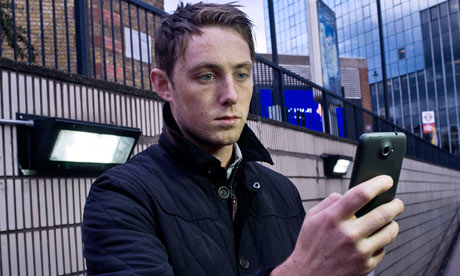
Painfully slow mobile internet connections have long been a bugbear for smartphone owners made to wait while trying to load a simple map or webpage. But things may be changing, if the mobile operator EE is to be believed, after it launched the UK's first fourth-generation network on Tuesday, promising speeds faster than most home broadband services.
Setting out to test EE's network around London with a HTC phone and 4G sim card supplied by the company, the Guardian was able to load the latest episode of Top Gear in less than 50 seconds in King's Cross– significantly faster than our tests on an Apple iPhone 5 using 3G.
Downloading the Angry Birds app took 16 seconds on the same 12.5 megabits per second (Mbps) connection, which is noticeably quicker than the average home broadband at 8Mbps.
General internet use – loading web pages, sending email and scanning Facebook or Twitter – is also faster over 4G, but more data-intensive tasks are where the network comes into its own. Loading the high-definition video for Carly Rae Jepson's track This Kiss took three seconds outdoors in Old Street, compared with eight seconds on a 3G connection.
But some remain unconvinced about the affordability of an EE 4G service, which costs £36 a month for 500MB of data, the equivalent of streaming a single one-hour programme on iPlayer or making a two-hour Skype video call.
"I imagine it will take off eventually but the first thing I've heard is how expensive it is," said Dan Blows, a developer at the TechHub startup workshop in Old Street, which is sometimes nicknamed Silicon Roundabout due to the prevalence of tech firms in the area. "I can't see many people upgrading just for bit of extra speed."
Some new 4G users in Southwark, south London, and in Manchester reported speeds of up to 19Mbps, which would rival some superfast fibre connections mainly used by businesses.
EE's 4G network opened for business in Birmingham, Bristol, Cardiff, Edinburgh, Glasgow, Leeds, Liverpool, London, Manchester, Sheffield and Southampton, with a further five cities to be added before Christmas. Vodafone, O2 and Three will be able to launch their own 4G services in May.
James Barford, of Enders Analysis, estimated that one in 10 mobile owners in the UK would benefit from 4G in the near future and predicted it would remain a largely premium service.
"There are a lot of everyday smartphone tasks that faster speeds will make quicker and easier, so it is an improvement in those terms," he said. "For the moment 4G is likely to be better than latest version of 3G because it's an empty network. If EE gets in the low hundreds of thousands of users by the end of the year, that will be pretty impressive. The price plans are as much a statement that 4G is a premium product, and they'll market it that way."

